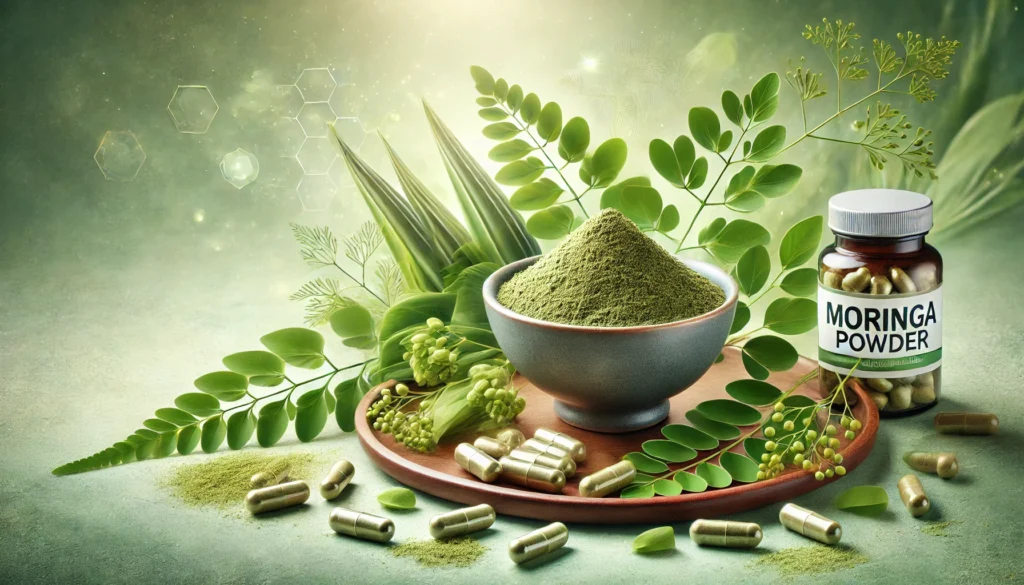Moringa, a superfood, has risen to the top of the nutritional conversation in recent years. Its exceptional nutritious profile, which includes a wide variety of vitamins, minerals, antioxidants, and amino acids, is responsible for its recent rise in popularity. Because of its all-encompassing nutrient combination, Moringa is positioned as a potent ally in preserving and improving health.
There are more reasons to include Moringa in your diet than simply its abundance of nutrients. It is praised for its numerous health advantages, which include, but are not limited to, increasing vitality, strengthening the immune system, and promoting cardiovascular health. Because of its adaptability, it may be effortlessly included into regular meals, making it a viable choice for individuals seeking to enhance their diet with a nutrient-dense, natural food. Because of its many health benefits, Moringa is more than simply a dietary supplement—it’s an essential part of a well-rounded, health-conscious lifestyle.
You May Also Like: 7
Top 10 Best Moringa Supplements: In-Depth Reviews
Moringa and Its Form
With roots that stretch back to the foothills of the Himalayas in northwest India and southern Punjab in Pakistan, Moringa is also known as the “Miracle Tree” or “Drumstick tree” because of its thin, triangular seed pods. A wide portion of the world may access this tree because it is robust and tenacious, growing well in tropical and subtropical temperatures. Its cultivation has extended over time to regions of Latin America, Africa, and Asia, where it is prized for its nutritional qualities as well as for its therapeutic and soil-health-improving qualities.
Moringa is considered a superfood due to its remarkable nutritional profile. Rich in necessary amino acids that the human body is unable to make, as well as minerals like calcium, potassium, and iron, it is also a great source of vitamins A, C, and E. Particularly the leaves are a valuable addition to vegetarian and vegan diets due to their high protein content, which is unusual for a plant. In addition, the antioxidants quercetin and chlorogenic acid found in Moringa help fight oxidative stress and may also stabilize blood sugar levels.
The effects of Moringa on health are numerous and profound. Because of its strong antioxidant content, it may help lessen the risk of chronic illnesses including diabetes and heart disease by battling free radicals and reducing inflammation. The plant’s anti-inflammatory qualities have also been connected to a decrease in arthritis and other inflammatory disease symptoms. Blood lipid profiles have been demonstrated to be positively impacted by Moringa, which may support cardiovascular health. Its high calcium content promotes bone health, while its substantial iron content helps fight anemia.

Utilized Parts of the Moringa Plant
- Leaves: Often used fresh in salads or dried and powdered for supplements, Moringa leaves are the most nutrient-dense part of the plant. They can be cooked similarly to spinach or used to make tea.
- Powder: Made from dried leaves, Moringa powder is a versatile supplement that can be added to smoothies, juices, or sprinkled on foods, providing an easy way to boost nutritional intake.
- Seeds: Moringa seeds can be eaten like nuts or used to purify water, thanks to their coagulating properties. They’re also a source of oil.
- Oil: Extracted from the seeds, Moringa oil is used in cooking, cosmetics, and skin care products. It is appreciated for its antioxidant and anti-inflammatory properties.
The fact that different portions of the Moringa plant are used highlights the plant’s adaptability and wide range of advantages. Moringa has gained widespread recognition due to its numerous health benefits, including enhanced nutritional intake, therapeutic properties, and usage in cosmetic applications. Moringa is positioned to continue playing a significant role in conversations about natural health and wellbeing throughout the world as more of its potential is discovered via study.
Preparations of Moringa
Moringa Oleifera, with its rich nutritional profile and health benefits, can be consumed in various forms to suit different preferences and lifestyles. Each form offers its own set of advantages and considerations in terms of nutrient availability and ease of use.
Fresh Leaves
Pros:
- Nutrient-Rich: Consuming Moringa in its fresh leaf form ensures you receive a high concentration of live enzymes, vitamins, and minerals.
- Versatility in Cooking: Fresh leaves can be added to salads, soups, and other dishes, making them a flexible ingredient in meal preparation.
Cons:
- Availability: Depending on your location, fresh Moringa leaves might not be readily available throughout the year.
- Shelf Life: Fresh leaves have a limited shelf life and require proper storage to maintain their nutritional value.
Powder
Pros:
- Convenience: Moringa powder can be easily added to smoothies, juices, or sprinkled over meals, making it a convenient way to boost nutrient intake.
- Long Shelf Life: When stored properly, Moringa powder can last for several months without losing its nutritional potency.
Cons:
- Processing: The drying process may reduce some of the vitamin C and other heat-sensitive nutrients compared to fresh leaves.
- Taste: The powder has a strong flavor that may not be palatable to everyone and can dominate the taste of certain dishes.
Capsules
Pros:
- Ease of Use: Capsules offer a quick and convenient way to consume Moringa without tasting it, ideal for those who dislike the flavor.
- Portability: Easy to carry and consume on the go, making it suitable for busy lifestyles.
Cons:
- Nutrient Absorption: The body may not absorb nutrients from capsules as effectively as it does from fresh or powdered forms.
- Cost: Moringa capsules can be more expensive than buying the leaves or powder in bulk.
Tea
Pros:
- Hydration: Moringa tea provides a hydrating way to enjoy the benefits of Moringa while increasing your fluid intake.
- Antioxidant Properties: Brewing the leaves into tea can help retain most of the antioxidants and other water-soluble nutrients.
Cons:
- Limited Nutrients: Some fat-soluble vitamins and minerals may not be as readily available in tea form compared to consuming the leaves or powder.
- Preparation Time: Requires boiling water and steeping time, making it less convenient than capsules or powder.
Oil
Pros:
- Skin and Hair Care: Rich in antioxidants and beneficial acids, Moringa oil is excellent for topical use, promoting healthy skin and hair.
- Cooking: High smoke point makes it a healthy cooking oil option, retaining nutritional value even when heated.
Cons:
- Nutrient Concentration: While beneficial for external use, Moringa oil does not provide the same range of nutrients when consumed as the leaves, powder, or capsules do.
- Cost: Moringa oil is often more expensive than other forms due to the extraction process required.
Each form of Moringa offers unique benefits, making it accessible and beneficial in various ways. Whether you prefer the direct nutritional benefits of consuming fresh leaves and powder or the convenience and external benefits of capsules and oil, Moringa provides a versatile solution to enhancing health and well-being.
Fresh Moringa Leaves
Fresh Moringa leaves are a vibrant, nutritious addition to a wide array of dishes. Their versatility in the kitchen allows for easy incorporation into salads, soups, and other meals, enhancing not only the nutritional value but also introducing an intriguing flavor profile to your dishes.
Taste Profile
Fresh Moringa leaves have a slightly earthy taste, akin to spinach or arugula, with a hint of a peppery finish. This unique taste makes them an excellent addition to meals, providing a subtle yet distinct flavor. When cooked, the leaves become milder and blend seamlessly with other ingredients, making them a versatile green for culinary use.
Incorporation into Salads
- Raw in Salads: Fresh Moringa leaves can be used raw in salads. Given their potent flavor, it’s recommended to mix them with milder greens to balance the taste. Pairing them with a citrusy or sweet dressing can also help in harmonizing the flavors.
- As a Garnish: Finely chopped Moringa leaves can serve as a nutritious garnish for salads, adding a splash of color and a nutritional boost.
Incorporation into Soups and Other Dishes
- Soups and Stews: Moringa leaves can be added to soups and stews in the last few minutes of cooking. This preserves their nutrients and adds a fresh, green flavor to the dish.
- Stir-fries: Incorporate Moringa leaves into stir-fries just before removing them from the heat. They cook quickly and can be combined with a variety of vegetables for a nutritious meal.
- Smoothies: For an extra health kick, a handful of fresh Moringa leaves can be blended into green smoothies. Their taste is easily masked by fruits such as bananas, mangoes, or berries.
A delicious method to increase the nutritious content of your meals is to include fresh Moringa leaves in your diet. Moringa leaves have a distinct flavor and are loaded with health benefits, whether they are cooked or used raw in salads. Making the most of this amazing superfood can be ensured by using storage methods that preserve its nutritional qualities.

Integrating Moringa Powder into Your Daily Life
Moringa powder is a multipurpose superfood that is simple to include in your regular diet and provides an easy approach to increase your intake of vital nutrients. Its earthy flavor goes well with a wide range of flavors, which makes it ideal for use in juices, smoothies, and even baked products. Here are some tips for ensuring that incorporating Moringa powder into your meals is both helpful and pleasurable, as well as how to get started.
Smoothies
Adding Moringa powder to smoothies is one of the most popular ways to enjoy its health benefits. Its flavor pairs well with both fruits and vegetables, allowing for a range of combinations. For a nutrient-packed smoothie, mix 1-2 teaspoons of Moringa powder with your choice of fruits (like bananas, berries, or mangoes), leafy greens (spinach or kale for extra nutrients), a protein source (such as Greek yogurt or almond butter), and a liquid base (like almond milk or coconut water). The Moringa powder will add a nutrient boost without overwhelming the other flavors.
Juices
Moringa powder is simple to use into your preferred freshly squeezed juice. A teaspoon of Moringa powder improves the nutritional profile of any juice—orange, carrot, or green—without sacrificing flavor. Before incorporating the powder into the bigger batch, consider blending it with a little bit of liquid to make a paste if you discover that it doesn’t dissolve all the way.
Baked Goods
Moringa powder can also be a nutritious addition to baked goods. When making bread, muffins, or pancakes, you can substitute a small amount of flour with Moringa powder (about one to two tablespoons for every cup of flour in the recipe). This not only infuses your baked treats with vitamins, minerals, and antioxidants but also gives them a beautiful green hue. Because of its potent flavor, start with a small amount and adjust according to your taste preferences.
Recommended Daily Dosage
The recommended daily dosage of Moringa powder varies but starting with 1-2 teaspoons per day is a good guideline for most adults. This amount allows you to enjoy the benefits of Moringa without overdoing it. Gradually, you can adjust the dosage based on your nutritional needs and how your body responds.
Integrating Moringa powder into your diet can significantly enhance your nutrient intake with minimal effort. By following these tips and paying attention to your body’s responses, you can make Moringa powder a beneficial and enjoyable addition to your daily wellness routine.

Moringa Capsules and Pills: A Convenient Nutritional Boost
It can be difficult for people with hectic schedules to keep a diet that is both balanced and nutrient-rich. Moringa tablets and capsules are a practical way to get this superfood in a small, easy-to-eat form without having to prepare meals or change the taste. Because of its ease of use, you can easily include the many health advantages of Moringa into your daily routine, whether you’re at home, at work, or on the go.
Convenience for Busy Lifestyles
For people who don’t have time to prepare elaborate meals or who don’t like the flavor of Moringa powder, Moringa capsules are a great supplement because they contain the same nutrient-dense profile as the plant’s leaves. The capsules don’t require blending, mixing, or cooking because they may be taken fast with water. Because of its simplicity of use, you can use the vital vitamins, minerals, antioxidants, and amino acids that Moringa provides to support your diet even on your busiest days.
Dosage Recommendations
It is important that you adhere to the dosage guidelines recommended by the manufacturer or a healthcare provider when using Moringa capsules in your diet. Depending on the amount of Moringa powder in each capsule, the recommended daily dosage often varies but usually consists of 1 to 4 capsules. To determine your body’s tolerance, it’s best to start with a smaller dose and raise it gradually as directed.
Best Time for Absorption
For optimal absorption, consider the timing of when you take Moringa capsules. Although Moringa can be taken at any time of day, some prefer to take it in the morning or early afternoon to harness its energy-boosting effects without interfering with sleep patterns. Taking Moringa with a meal can also aid in the absorption of fat-soluble vitamins (such as vitamins A, D, E, and K) present in the capsules. However, since Moringa can have a mild diuretic effect for some people, it’s wise to monitor how your body responds when taking it at different times of the day.
Moringa Tea: Preparation and Calming Effects
Made from the dried leaves of the Moringa Oleifera tree, Moringa tea is a nourishing and peaceful beverage alternative that is simple to make and has several health advantages, including a calming effect on the body and mind. Its mild, earthy flavor is a nice way to add some extra nutrition to your day. Here are some tips for making Moringa tea and when it’s best to drink it.
Preparing Moringa Tea
Ingredients:
- 1-2 teaspoons of dried Moringa leaves or a Moringa tea bag
- Hot water (approximately 1 cup)
- Optional: honey, lemon, or mint to taste
Instructions:
- Boil Water: Start by boiling water. If you have an electric kettle with temperature settings, aim for about 185°F (85°C), which is just below boiling, to preserve the delicate nutrients of the leaves.
- Steep the Tea: Add the dried Moringa leaves or tea bag to a cup. Pour the hot water over the leaves or tea bag and allow it to steep for about 5-10 minutes. The longer you steep, the more intense the flavor and nutrients released.
- Strain and Serve: If using loose leaves, strain the tea into another cup to remove the leaves. If you’re using a tea bag, simply remove it.
- Flavor as Desired: Add honey, lemon, or mint if you like. These can enhance the flavor and add their own health benefits to your Moringa tea.
Calming Effects
In addition to its nutritional advantages, Moringa tea is well known for its relaxing effects. It has ingredients that, without having the sedative qualities of some herbal teas, can aid in promoting calm and lowering tension. Because of this, it’s a great option for times when you need to unwind without falling asleep.
Ideal Times for Moringa Tea
- Morning Start: Begin your day with Moringa tea to enjoy its energizing properties without the jitteriness associated with caffeine. Its vitamins and minerals can help kickstart your metabolism and focus for the day ahead.
- Afternoon Break: Sipping Moringa tea in the early afternoon can be a perfect way to rehydrate and replenish your body’s nutrients, providing a gentle energy boost to carry you through the rest of the day.
- Evening Wind-down: Although Moringa is known for its energy-boosting effects, its calming properties also make it suitable for evening consumption, especially if prepared in a less concentrated form. It can be part of your nighttime routine to relax and unwind before bed.
Scenarios for Consumption
- During Stressful Workdays: Moringa tea can be a soothing companion during intense work periods, offering mental clarity and a calm focus.
- Post-Exercise Recovery: The anti-inflammatory properties of Moringa make the tea a good post-workout drink, helping to soothe muscle soreness and aid recovery.
- Relaxation and Meditation: Enjoy Moringa tea as part of your meditation or yoga practice to enhance relaxation and mindfulness.
Moringa tea is a versatile beverage that may be enjoyed at different times of the day due to its unique blend of relaxing effects and health-promoting minerals. Moringa tea can be a delicious and healthy option if you want to increase your vitamin intake, find some peace and quiet, or just need a little pick-me-up.

Moringa Oil: Versatility and Benefits
The remarkable nutritional profile and adaptability of Moringa oil, which is derived from the seeds of the Moringa Oleifera tree, make it noteworthy. This oil, which is well-known for its stability and oxidation resistance, is used as a powerful natural cure for skin and hair care as well as a beneficial ingredient in cooking and as a respected nutritional supplement. In this section, we will examine the various applications of Moringa oil, including how well it works as a nutritional supplement, in cooking, and as a topical treatment for healthy skin and hair.
Culinary Uses
Cooking and Flavoring: Moringa oil has a mild, pleasant taste and a high smoke point, making it an excellent choice for frying, sautéing, and baking. Its subtle flavor doesn’t overpower dishes, complementing both sweet and savory recipes. As a dressing or dip, it adds a nutritional boost to salads and raw vegetables without compromising taste.
Nutritional Supplement: Ingesting Moringa oil provides a concentrated source of the plant’s potent antioxidants and essential fatty acids, such as oleic acid, which promotes heart health and can aid in balancing cholesterol levels. Its rich content of vitamins A and E also supports immune function and overall well-being when incorporated into the diet.
Topical Benefits for Skin and Hair
Skin Care:
- Moisturizing: Moringa oil is a powerful moisturizer, thanks to its high oleic acid content. It penetrates deeply into the skin, providing long-lasting hydration without leaving a greasy residue.
- Anti-Aging: The antioxidants in Moringa oil, such as vitamin C and beta-carotene, fight free radicals, reducing the appearance of aging signs like fine lines and wrinkles. It also supports the skin’s ability to repair itself, maintaining a youthful complexion.
- Anti-Inflammatory: Its anti-inflammatory properties make Moringa oil beneficial for soothing conditions like eczema, psoriasis, and general skin irritation, promoting healing and reducing redness.
Hair Care:
- Scalp Health: Moringa oil can be massaged into the scalp to stimulate hair growth and soothe dry, flaky skin, reducing dandruff and promoting healthier hair follicles.
- Strength and Shine: Applying Moringa oil to the hair can strengthen strands, prevent split ends, and give hair a natural shine. Its deep-conditioning effect helps to detangle hair and make it more manageable.
Even though Moringa oil has many advantages, you need to get a high-quality, cold-pressed oil to make sure you’re getting all of the antioxidants and minerals it contains. Because it’s concentrated, start with little amounts to determine your preference—for culinary reasons, a little goes a long way.
It is vtial to conduct a patch test before topical use, especially for individuals with sensitive skin, to make sure there is no allergic reaction. After it has been determined to be safe, Moringa oil can be used topically on the skin or hair or combined with other organic components to create personalized skincare and haircare products.
Incorporating Moringa oil into your daily routine, whether in the kitchen or as part of your beauty regimen, can offer significant health and cosmetic benefits. Its natural composition, rich in essential nutrients, makes Moringa oil a valuable addition to a holistic approach to health and wellness.

Moringa Seed: Nutritional Value and Consumption
Moringa seeds are packed with nutrients, offering a good source of vitamins, minerals, antioxidants, and essential amino acids. They contain significant amounts of vitamin C, calcium, potassium, and amino acids, making them a potent dietary supplement.
How to Consume:
- Raw or Roasted: Moringa seeds can be eaten raw or roasted for a snack. Start with a small number (1-2 seeds per day) as they are potent and have a strong flavor.
- Water Purification: Crushed Moringa seeds are used to purify water, showcasing their antibacterial properties.
- Oil Extraction: Moringa seed oil, also known as Ben oil, can be extracted and used in cooking, skincare, and hair care products.
Dietary Supplement Uses:
- Nutritional Boost: Consuming Moringa seeds can help augment your diet with essential nutrients, supporting overall health.
- Antioxidant Benefits: The antioxidants in Moringa seeds contribute to reducing oxidative stress and may support heart health and immune function.
- Weight Management: Their high fiber content can aid in digestion and promote a feeling of fullness, supporting weight management efforts.
When incorporating Moringa seeds into your diet, moderation is key due to their potent properties. Starting with a small quantity allows you to gauge your body’s reaction and adjust accordingly.

Precautions and Recommendations for Moringa Consumption
Even though Moringa is praised for its many nutritional advantages, moderation in consumption is important to prevent any potential negative effects. Being aware of its powerful qualities will help reduce any negative effects and ensure that your health will improve.
Importance of Moderation
All forms of Moringa—leaves, seeds, powder, and oil—have significant concentrations of bioactive chemicals, vitamins, and minerals. Excessive consumption, while advantageous, may cause an imbalance inside the body. For example, consuming too many Moringa seeds may have a laxative effect, and because the leaves and powder have a large amount of fiber, consuming too much of them may cause discomfort in the digestive system.
Potential Side Effects
- Digestive Issues: Overconsumption of Moringa, especially in powder form, can lead to gastrointestinal upset, including gas, bloating, and diarrhea.
- Interactions with Medications: Moringa has been known to interact with certain medications, including those for diabetes and high blood pressure, by affecting how the body processes these drugs.
- Pregnancy and Breastfeeding: Due to its potent properties, pregnant and breastfeeding women should consult a healthcare provider before adding Moringa to their diet.
Recommendations
- Start Slow: Begin with a small amount of Moringa to assess how your body responds, gradually increasing the dosage if no adverse effects are observed.
- Consult Healthcare Providers: Especially if you are taking medication, are pregnant, or breastfeeding, it’s important to discuss with a healthcare provider to ensure Moringa’s benefits align with your health needs without causing interactions.
- Quality Matters: Source high-quality, pure Moringa products to ensure you’re getting the benefits without contaminants.
In summary, while Moringa is a powerful superfood capable of enhancing your diet and health, it should be consumed with mindfulness to its potent effects. By following these precautions and recommendations, you can safely incorporate Moringa into your wellness routine, maximizing its benefits while minimizing any potential risks.
Multiple Ways to Enjoy Moringa Nutrient-Dense Supplement: Final verdict
Moringa is a versatile tree with all parts of it being edible and safe for human consumption. In addition to its versatility in terms of which parts of it are nutritious and edible, it is also versatile in that it can be consumed as a supplement in many forms. Moringa can also be applied topically to the skin, scalp, and hair. All of this and more has been explored in this article, including times of days when it’s best to consume certain forms of Moringa, as well as the pros and cons of each type of Moringa supplement. This versatility allows users to have flexibility and be empowered as they use Moringa to improve their health.
References:
- “What Is Moringa Good For?” Retrieved from: https://www.verywellhealth.com/the-uses-and-benefits-of-Moringa-4149435
- “Moringa oleifera: An Updated Comprehensive Review of Its Pharmacological Activities, Ethnomedicinal, Phytopharmaceutical Formulation, Clinical, Phytochemical, and Toxicological Aspects.” Retrieved from: https://www.ncbi.nlm.nih.gov/pmc/articles/PMC9916933/
- “The Impact of Moringa oleifera Supplementation on Anemia and other Variables during Pregnancy and Breastfeeding: A Narrative Review.” Retrieved from: https://www.ncbi.nlm.nih.gov/pmc/articles/PMC10301989/
- “How to Eat Moringa Leaves.” Retrieved from: https://www.wikihow.com/Eat-Moringa-Leaves
- “Are There Health Benefits to Drinking Moringa Tea?” Retrieved from: https://www.webmd.com/diet/Moringa-tea-health-benefits
Important Note: The information contained in this article is for general informational purposes only, and should not be construed as health or medical advice, nor is it intended to diagnose, prevent, treat, or cure any disease or health condition. Before embarking on any diet, fitness regimen, or program of nutritional supplementation, it is advisable to consult your healthcare professional in order to determine its safety and probable efficacy in terms of your individual state of health.
Regarding Nutritional Supplements Or Other Non-Prescription Health Products: If any nutritional supplements or other non-prescription health products are mentioned in the foregoing article, any claims or statements made about them have not been evaluated by the U.S. Food and Drug Administration, and such nutritional supplements or other health products are not intended to diagnose, treat, cure, or prevent any disease.


